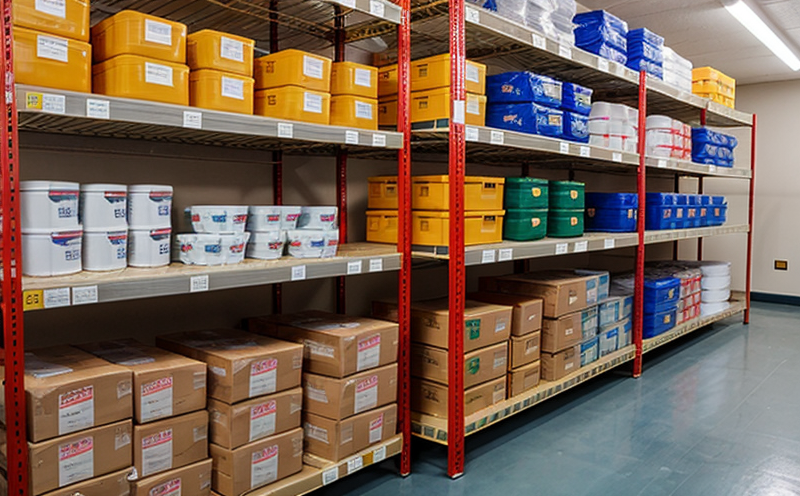Ampoule Stability Testing
The pharmaceutical industry places an immense emphasis on ensuring product quality and safety. Ampoule stability testing is a critical component of this effort, designed to evaluate the integrity and performance of ampoules over time under various environmental conditions. This test ensures that products remain stable during storage, shipping, and shelf-life, thus maintaining efficacy and potency. The primary objective is to determine the optimal storage conditions for the drug product and its containers.
During stability testing, ampules are subjected to a range of conditions including temperature, humidity, light exposure, and time. These tests are conducted in controlled environments that simulate real-world scenarios such as shipping from manufacturers to pharmacies or prolonged shelf-life under different environmental stressors. The goal is to predict the product's stability over its intended shelf life.
The testing process involves a series of steps which include sample selection, preparation, and exposure to specific conditions for a predetermined period. Samples are then analyzed using analytical techniques such as high-performance liquid chromatography (HPLC), gas chromatography-mass spectrometry (GC-MS), or infrared spectroscopy (IR) depending on the product's characteristics.
Compliance with international standards is crucial in this field, and stability testing must adhere to guidelines set by regulatory bodies like the FDA, EMA, and International Conference on Harmonisation (ICH). These standards include specific acceptance criteria for ampoule integrity and drug product performance. For instance, ICH guidelines specify that ampoules should maintain their structural integrity under conditions of heat, light, and moisture.
The importance of this testing cannot be overstated as it directly impacts patient safety and satisfaction. Ensuring the stability of ampoules helps in preventing potential recalls due to compromised product quality. Additionally, accurate stability data supports the approval process by regulatory authorities and facilitates informed decision-making regarding product labeling and storage instructions.
It is important for pharmaceutical manufacturers to invest in robust stability testing protocols. This includes not only the physical properties of the ampoule but also the chemical stability of the drug product inside it. By conducting comprehensive stability studies, companies can optimize their supply chain logistics, reduce waste, and ultimately enhance patient care.
Industry Applications
| Application Area | Description |
|---|---|
| Drug Manufacturing | Evaluating the stability of drug products in different ampule types to ensure consistent quality. |
| Distribution Logistics | Testing conditions simulating shipping environments to determine optimal storage solutions. |
Ampoule stability testing plays a pivotal role in several industry applications. In drug manufacturing, this test helps manufacturers understand how different ampule materials and designs affect the shelf life of their products. This information is crucial for optimizing production processes and ensuring consistent quality across batches.
For distribution logistics, the results from these tests are used to design more efficient supply chains. By understanding the environmental factors that impact ampoules, companies can choose the most suitable storage solutions, reducing waste and improving patient access to medication.
Why Choose This Test
- Ensures product stability under real-world conditions.
- Supports regulatory compliance and approval processes.
- Aids in optimizing supply chain logistics for improved efficiency.
- Promotes patient safety by preventing recalls due to compromised products.
- Enhances brand reputation through consistent quality assurance.
The ampoule stability test is an indispensable tool in the pharmaceutical industry. It ensures that drug products remain stable and effective throughout their shelf life, thereby enhancing patient safety and satisfaction. This testing also supports regulatory compliance and approval processes, ensuring that only high-quality products reach the market. By providing data on product performance under various conditions, this test plays a vital role in optimizing supply chain logistics for improved efficiency.
Furthermore, ampoule stability testing promotes brand reputation by demonstrating commitment to quality assurance. Consistent results from these tests can significantly enhance a company's credibility and trustworthiness among consumers and regulatory bodies alike.
Competitive Advantage and Market Impact
The implementation of robust ampoule stability testing provides pharmaceutical companies with significant competitive advantages in the marketplace. By ensuring product quality through comprehensive testing, companies can differentiate themselves from competitors who may not meet the same rigorous standards. This commitment to excellence can lead to increased market share as consumers increasingly value brands that prioritize patient safety and satisfaction.
Moreover, compliance with international standards such as ICH guidelines not only ensures regulatory approval but also opens doors to international markets where strict quality controls are enforced. Companies demonstrating a strong commitment to these standards are often viewed favorably by global regulators and thus gain an edge in international trade.
The results of stability testing can also inform strategic decisions regarding product labeling, storage instructions, and even the design of new ampule types. This deep understanding of product behavior under various conditions allows companies to make informed choices that not only enhance product quality but also reduce costs associated with recalls or suboptimal supply chain management.
Overall, the impact of robust stability testing extends beyond individual products; it contributes to the overall health and safety of patients worldwide. By ensuring consistent quality and reliability across all stages of production and distribution, pharmaceutical companies can build trust and loyalty among consumers, which is crucial in today’s competitive market environment.





